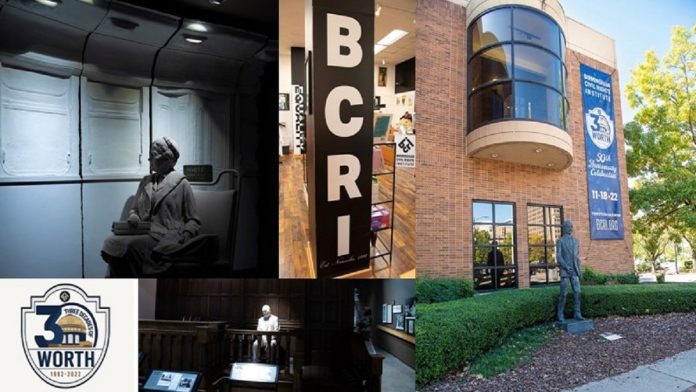DeJuana Thompson can’t recall a single year during her time attending Birmingham public schools when she didn’t visit the Birmingham Civil Rights Institute (BCRI). And while those many experiences helped shape her adolescence, it wasn’t until she was about 25 that BCRI first “came alive” for her.
As a community liaison for then-City Council President Carole Smitherman, Thompson was tasked with helping develop the 2005 programming to honor the four little girls who were murdered in the 1963 Sixteenth Street Baptist Church bombing.
Titled “From Tragedy to Triumph,” the program focused on the atrocity and the changes that came about as a result of the bombing. It featured then-Secretary of State Condoleezza Rice and former British Prime Minister Tony Blair. The time Thompson spent planning and researching the program with then-BCRI CEO Lawrence Pijeaux and his staff helped her understand the institute’s purpose.
“They just brought so much into focus: how the Institute doesn’t just stand as a place that’s preserving history. It’s really about taking the knowledge of what happened and applying it to opportunities for us to advance human rights today.”
Now, Thompson is the president and CEO of BCRI, which is marking its 30th anniversary this weekend. The events kick off Friday, Nov. 18 at 6 p.m. with a celebration at Haven featuring performances by R&B singer Lalah Hathaway, as well as remarks from former Birmingham Mayor Richard Arrington, BCRI co-founder Odessa Woolfolk, Mayor Randall Woodfin and Thompson.
BCRI will also present its most distinguished honor – the Rev. Fred L. Shuttlesworth Human Rights Award – during the event. This year’s recipient is Myrlie Evers-Williams, an activist, author and wife of civil rights activist Medgar Evers, who was gunned down in front of their home in Mississippi in1963. Evers-Williams has been a lifelong champion of civil rights, starting in the mid-1950s when she and her husband opened the first NAACP field office in that state.

The Birmingham Civil Rights Institute celebrates its 30th anniversary on Nov. 18. (Anthony Cook / Alabama NewsCenter)

The Birmingham Civil Rights Institute celebrates its 30th anniversary on Nov. 18. (Anthony Cook / Alabama NewsCenter)

The Birmingham Civil Rights Institute celebrates its 30th anniversary on Nov. 18. (Anthony Cook / Alabama NewsCenter)

The Birmingham Civil Rights Institute celebrates its 30th anniversary on Nov. 18. (Anthony Cook / Alabama NewsCenter)

The Birmingham Civil Rights Institute celebrates its 30th anniversary on Nov. 18. (Anthony Cook / Alabama NewsCenter)

The Birmingham Civil Rights Institute celebrates its 30th anniversary on Nov. 18. (Anthony Cook / Alabama NewsCenter)
In 2018, the institute announced that renowned civil rights activist and educator Angela Davis, a Birmingham native, would be that year’s recipient of the Fred L. Shuttlesworth Human Rights Award, an honor given out by the BCRI every year. The following January, however, the organization rescinded its announcement, which was reinstated only following outcry from residents and city leaders, including Woodfin, who claimed the institute leaders had shown “poor stewardship.”
Following the award controversy, which resulted in the departure of all but one member of BCRI’s former nine-member board of directors (now expanded to 21), came several other challenges. In 2020, the pandemic significantly reduced attendance, and the institute’s president of five years, Andrea Taylor, resigned. Additionally, Thompson said, the increasing unrest related to police killings of Black people, following the death of George Floyd in May 2020, dealt “gut hits” to the BCRI “like many components of our community.”
“I think that because the institute is a living, breathing thing, it is going to always have real challenges,” Thompson said. “We as humans, as living breathing things, we have different seasons, we have different things that we go through, and we come through those things. We come out on top, hopefully.”
Looking forward, BCRI can realize a larger role by increasing engagement among people locally, Thompson said.
“The more proximate people get to the institute, the more they come back in the doors, the more they engage with our programming, engage with our students, engage with our staff, engage with our elders, the oral histories … I think they will find and remember, ‘Wow, we really do have a jewel! This is our institute. It’s our legacy. It’s a shared legacy.’”
This story was originally published by The Birmingham Times.





